Newsletter for May, 2016
 For Our Church and for the Earth: A Time for Honesty, Integrity, and Wisdom
For Our Church and for the Earth: A Time for Honesty, Integrity, and Wisdom
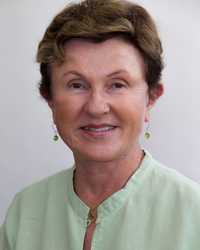 For Team Success, “Be Kind and Listen!”
For Team Success, “Be Kind and Listen!”
What makes a successful team? Google recently studied just that and published an article in “The New York Times.” I have read and reread it because I love this stuff, and as President I want to see successful “teams” in our congregation and do what I can to foster them. So what is the essence of teamwork? Google’s Project Aristotle set out to find out.
As the researchers struggled to figure out what made a team successful, they kept coming across research by psychologists and sociologists that focused on what are known as ‘‘group norms.’’ Norms are the traditions, behavioral standards, and unwritten rules that govern how we function when we gather. Norms can be unspoken or openly acknowledged, but their influence is often profound. Team members may behave in certain ways as individuals — they may chafe against authority or prefer working independently — but when they gather (as we do as a congregation), the group’s norms typically override individual proclivities and encourage deference to the team. Researchers found that psychological safety was the key. For Project Aristotle, research on psychological safety pointed to particular norms — namely communication and empathy — that are vital to success.
Project Aristotle’s researchers had figured out which norms were most critical. Now they had to find a way to make communication and empathy — the building blocks of forging real connections — into something workable. As the researchers studied various groups, they noticed two behaviors that all the good teams generally shared. First, members spoke in roughly the same proportion. As long as everyone got a chance to talk, the team did well, but if only one person or a small group spoke all the time, the collective intelligence declined. Second, the good teams all had high ‘‘average social sensitivity’’ — a fancy way of saying they were skilled at intuiting how others felt based on their tone of voice, their expressions, and other nonverbal cues.
As a congregation, we establish norms through our covenants and our seven principles, but they don’t always work in practice, as we have sadly witnessed. That is the task ahead of us. Abby Arnold summed up the essence of the Google study in our recent Pledge Team meeting. “Be kind and listen!”
— Patricia Wright
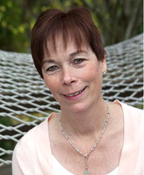 Introducing our Congregational Consultant, Nancy Edmundson
Introducing our Congregational Consultant, Nancy Edmundson
Nancy is Midwestern-born and raised with formal degrees in biology and physical therapy from the University of Nebraska, College of Medicine. In 1984 with her California-bred husband she transplanted to Santa Barbara, where they practiced physical therapy and raised their family. She has been a member of the Unitarian Society of Santa Barbara since 1990, and has enjoyed facilitating groups of children, youth, and adults in a variety of USSB programs and roles. She has served as a religious professional as the Director of Administration for the USSB for 10 years, and she has consulted with numerous congregations in a leadership development capacity and facilitated lay leadership development retreats. She has served the Pacific Southwest District in a variety of roles since 1991 and currently serves on the UUA Pacific Western Region Ministerial Transition Team. In 2012 she was honored with the Distinguished Service award from the Pacific Southwest District of the Unitarian Universalist Association. Nancy has been a Courage & Renewal® facilitator since 2012. Nancy has worked in community organizing for alternative education in the areas of charter schooling and homeschooling in California and has been instrumental in the development of an interfaith county-wide Warming Center program for unsheltered homeless in Santa Barbara County and currently serves on the board of PFLAG Santa Barbara.
I want to introduce myself to you and to say that I am humbly honored to work with your congregation at a time that is challenging for all. This is a tender and important time in your congregational life. I look forward to working with you to design and live into a process to begin to heal your divisions, and then move to identifying and clarifying other underlying issues. We will take this a step at time and adjust as we go. We will rebuild trust and healthy communication first, so that we may then turn to work on clarifying other important systems and processes that may need to be established or would benefit from clarification of process, roles, and accountability. This relationship will call upon all of us to fully engage in a spirit of good will, and I am privileged to journey with you in a supportive and consultative role.
— Nancy Edmundson
About “Right Relations”
When we talk about “right relationships” we refer to tending to relationships at all levels of congregational life — personal, interpersonal, institutional and cultural or ideological; creating and maintaining environments that inspire growth and transformation in order to support individuals and the congregation to live out our deepest, most life-affirming vision, mission, and values.
Your congregation is in a time of conflict. When we are in right relationship with one another we can welcome conflict as a natural part of healthy congregational life, and we can navigate and manage change (and congregations are always changing). If we lack information or skills for engaging constructively in conflict, or if we don’t have a foundation of right relationships, change and conflict can tear us apart. A process of right relations is designed help to bring us back to our better selves, and to listening and communicating deeply and respectfully to one another, even when we disagree. From this place we can begin to discover and articulate the core values of your unique congregation and articulate a covenant of right relations and processes to support and maintain that covenant.
In a congregation of human beings, there are always areas of difference, varying world views, opinions, prejudices, and strongly held, often contradictory, beliefs. For example, we may hear such things as, “You can’t talk about that (issue of your choice) here,” “Can I be a Christian here?”, “Can you be a Republican here?”, and “I’m pro-life. Am I welcome here?” In a congregation of right relations, openness about our personal truths is possible if we acknowledge the right and responsibility of others to share their different views.
What does right relations give us? When we find our congregation in conflict, we may have many reasons to doubt, to lose hope, and to despair of our own and others’ behaviors. Instead, we choose right relationships, to restore right relationships, and to stay attentive to maintaining right relationships. We choose to act as if people can be good and we can trust them. Trust them not blindly, not foolishly, but hopefully. We do this knowing that human beings are complex and that there are road blocks along the way. Then your congregation can become a life-affirming community where individuals can live out their best intentions, forgive themselves and others when necessary, and celebrate the gift of life and love in community.
— Nancy Edmundson
UUSM ELECTIONS 2016
A Letter from the Nominating Committee
Given the turmoil this spring, many people have asked how the Nominating Committee works and how we make nominations to the Board. The Nominating Committee is required by our bylaws to select nominees for the Board of Directors and the Nominating Committee. These nominees are voted on at the Annual Meeting.
The Nominating Committee consists of six members, each elected for a staggered three-year term, with two people elected every year. The entire committee turns over every three years. This structure, along with bylaws preventing the Board from directing the Nominating Committee, keeps the committee independent.
We discussed what qualities we should look for in filling Board positions and what procedures we should use. We also talked about these things with the Rev. Tera Little (our minister while Rebecca was on her sabbatical), we talked with individual members of our congregation, and recently one of our members talked with the Rev. Ken Brown (the head of the March Report on the Congregational Conversations).
Our criteria for picking Board members this year emphasized leaders who have vision, listen and communicate well, deal effectively with conflict, have been active in the church, are capable of taking on the primary responsibility for running the church, and follow through on issues. We believe it’s imperative for the Board (along with everyone else) to have a long-range vision for our church that creates a growing community that helps individuals with their spiritual growth, helps give our children a good start on life, helps our church set its priorities, gives everyone a voice, and helps us thrive and interact with the wider world. To accomplish these aspirations we looked for potential Board Members who:
• are active in the church,
• make a financial contribution to the church,
• tend to attend services,
• are able to express their ideas clearly,
• are able to work effectively with a wide variety of people,
• can handle conflict and are able to understand a larger picture than their own,
• can inspire members to take an active role, and
• are excited by our UU beliefs and mission and can communicate that excitement to others.
Some members of the congregation recommended that we nominate more than one person per open position for the Board. Nominating only one person for each position may feel undemocratic. But, after Tera announced to the congregation her recommendations to get help healing deep conflicts, we decided it would be divisive to change the procedure of the last several years. We decided to nominate the one best candidate we could find for each position. We later found out that 90 percent of UU churches follow this procedure. In the middle of April we sent an email to the congregation that outlined procedures members could take to become nominees by petition for the Board of Directors or the Nominating Committee. The petitions have to be submitted to the office by May 2, 2016, and be validated by the Secretary of the Board. See our Church Bylaws, Article XII Nominations.
The final ballot and a statement from all candidates will be included in the election packet that will be prepared by the church office and sent out to all members before the election.
— Nominating Committee members: Beth Rendeiro, Bob Dietz, Gretchen Goetz (chair), James Witker, Rick Rhoads, Wendi Gladstone
Choice and Elections:
An opinion on “Choice” as we prepare for elections at our Annual Meeting
I have been active at UUSM for more than twenty years. In all that time, there have been two other contested elections, including the one for the Settled Minister Search Committee established after the Rev. Judith Meyer’s departure. In the spirit of “more democracy is better,” I appreciate the efforts by our congregation to create more choice on this year’s ballot. I respect the hard work of the Nominating Committee (I’ve been there!) and the community members the committee has put forth for election. I also respect the congregants who’ve said they would like to see other options for leadership and applaud those that have stepped forward.
Several people have reminded me in the last few weeks that, in the longstanding tradition of Unitarian Universalist congregations, our strength is rooted in our commitment to diversity. We are a community of atheists, theists, and everything in between. Our congregation encompasses young and old, newcomers and veteran UUs, gay, straight, and transgendered people of many colors and even more traditions. We are that way today, we will be that way when we are voting at our Annual Meeting, and we will continue to be that way afterwards. We need to remember to respect diversity and each other, and not create winners and losers.
I assume that each candidate who will be on the ballot (whether put forth by the Nominating Committee or by petition) has stepped forward with an offer to help lead us into better community with one another. I expect each will continue to contribute to our community regardless of the election results. Indeed, each of us has a role to play in advancing our UU values as members and leaders.
A dozen years ago, James Surowiecki authored the book, “The Wisdom of Crowds: Why the Many Are Smarter Than the Few and How Collective Wisdom Shapes Business, Economies, Societies and Nations.” In it, he lays out the case that “a diverse collection of independently deciding individuals is likely to make certain types of decisions and predictions better than individuals, or even experts.” (With no irony, I will tell you that sentence is lifted straight from Wikipedia!) This theory applies to the process of our collective congregational decision making. Together, we are wiser than we think.
— Pam Teplitz
An opinion about one consequence of our contested elections
I support democratic practices; in fact, one of the values that is most attractive about our community is that we discuss, we debate, and we vote about everything. However, I am concerned about one consequence of the contested elections for the board of directors.
There is currently a sharp division in our community between those concerned about congregational leadership. Aware of this division, the Nominations Committee, while nominating one candidate for each position, produced a slate that included people positioned on both sides of the divide. In contrast, the contested election will involve each of us debating how each candidate is positioned.
Contested elections may be democratic but in this case, they will be divisive. Being aware of this is important as our community works toward right relations.
— Vilma Ortiz
The UUSM Election Process According to Our By-laws
PETITION CANDIDATES:
The deadline for submitting 10 signatures of verified members of the congregation in support of a candidate is 20 days before the election, Monday, May 2. Submit to the office along with a maximum 200-word candidate statement in person, by fax (310-998-9181), or email (admin@ uusm.org).
ANNUAL MEETING AND ELECTION PACKETS:
The Board and office are preparing an Annual Meeting mailing that will include photos and candidate statements by all candidates. The mailing will also include information on the proposed 2016-2017 budget and other resolutions requiring a congregational vote. It should arrive by Tuesday, May 10. If you do not receive it or you perceive any problems, please contact the office.
ABSENTEE BALLOTS:
Voting members of the Church who do not expect to be present at the Annual Meeting on Sunday, May 22 may vote in absentia in either of two ways:
1) by designating another voting member, who will attend the meeting, as his or her proxy. No member is allowed to hold the proxy for more than one absent member. There is a form to complete that the proxy presents when signing in for the meeting; or
2) by completing and submitting an absentee ballot. Please return the absentee ballot to the church office and place in the church administrator’s mailbox (do not leave it on a desk) in an envelope marked “Absentee Ballot” with your name on the outside. Deadline for submitting absentee ballots to the church office is Friday, May 20, at noon. Both the proxy form and the absentee ballot will available in the front office beginning Friday, May 8.

Riveting Town Hall Meeting on Congregational Conversations
By Lois Hutchinson
The pews were packed and the atmosphere was charged at the March 20 Town hall to discuss the summary report on Congregational Conversations. Comments ranged from What the heck is going on? to Finally, we’re talking about this! Many expressed surprise at the recommendations proposed by the UUA Pacific Western Regional staff and called for deeper listening and greater understanding. The congregation’s deep divides and occasional rancor were recognized, overlaid with a tone of sadness. UUA’s Rev. Ken Brown was on hand to moderate the meeting and explain the motivations behind the recommendations.
No official business was conducted at the meeting. Members of the UUSM Board of Directors will use the feedback from congregants to inform discussions on how to move forward. Rev. Rebecca Benefiel Bijur was not present.
Rev. Ken began the meeting with a reassuring chalice lighting: words on covenants by Janice Marie Johnson (excerpt): “Our covenant stands firm. It is our embodiment of faith in each other. It is our blessing of each other. It is our commitment to each other.”
Sue Stoyanoff, cochair of the Committee on Ministry, explained the path that led to Congregational Conversations facilitated by UUA. She described rising voices of conflict and unhappiness. This led the committee to recommend, and the board to move forward with, a series of Congregational Conversations to allow members to express feelings, both happiness and disappointedness.
In February, 23 groups gathered feedback from fully half the membership. The goal was to use deep, respectful listening (no crosstalk) to move toward inclusion, communication and compassion. The questions were broad but simple, and members were asked to speak only from their personal experience and opinions.
The UUA staff prepared a summary report and recommendations, which was presented to the UUSM board and disseminated to the membership via email in mid-March. [Copies of the summary report and recommendations are available from the UUSM office.]
Sue expressed the entire committee’s sadness at the report’s recommendations. But the committee does agree with the report that the congregation is deeply divided.
Queuing up
Overall the commenters “spoke their own truths” and the audience was very respectful of speakers, applauding politely or enthusiastically, as they were so moved. Time limits were, by and large, respected and sometimes enforced by cutting the audio feed from the microphone.
Rev. Ken presented the report as a reflection of what UUA heard from congregants. The recommendations were formed by consensus of the UUA team and their long experience. He warned that deep work needs to be done by our congregation to heal and reconcile.
He explained the report’s most significant recommendation: that Rev. Rebecca conclude her ministry at UUSM. The report is about the congregation, but Rev. Rebecca has become a lightning rod. The UUA staffers believe in Rev. Rebecca and support her, Rev. Ken said, and she deserves a congregation that will support her work and career. He hopes we will follow the majority of the report’s recommendations. In response to a question from the floor, Rev. Ken described this type of rift as common among UU congregations.
Jacki Weber was first to the mic. She read an open letter to the UUSM leadership signed by 35 members. The letter requested more open communication and future town halls; along with deeper self-knowledge, vision and support of staff and volunteers. Attached to the open letter were 20+ personal messages that Jackie received from congregants; some who were not able to attend the Town Hall. Copies of the open letter and personal messages were distributed, and are available from the UUSM office.
Tom Peters spoke next as cochair of the Committee on Ministry. He recognized that while turnout for the Congregational Conversations was good, 150 people weren’t there to provide their input. He had observed several of the Congregational Conversations and considers them to be steps forward in coming together and feeing heard. He saw pain among the attendees, and he has seen that Rev. Rebecca has been hurt, too.
One congregant questioned Rev. Ken on why the UUA did not intervene to address these problems earlier. (The UUA summary report cites this delay as a factor in deepening our divisions.) Rev. Ken responded that UUA cannot provide its support to a congregation until invited by church leadership.
Later, Treasurer Kim Miller relayed a message from Vice President Dan Nannini: the Town Hall is about long-term relationships; about more than one issue, more than one moment. He is open to listening. Kim agreed with Dan on the need to listen more openly. Everyone, including herself, should cease the blaming and name-calling. It is unhelpful, she explained.
One member asked Rev. Ken to elaborate on the snippets of grievances that appear in the report. Rev. Ken responded that there is a great deal of documentation containing a range of opinions. Ken cited his experience in conflict resolution and 42 years as a minister; during which he’s completed about 30 of these analyses. And it is typical that people are surprised.
He explained that an activated 20 percent of the congregation makes the decisions about congregational life. Perhaps this is a wake-up call for more members to provide their vision of the kind of congregation that members need. UUA has provided a clear path, so the congregation can move forward. But the decisions lie with Rev. Rebecca and the board. The UUA staffers believe that it would to be difficult for UUSM to move forward with Rebecca. He said that Rev. Rebecca needs a congregation that is willing to move forward, and he does not see a strong willingness at UUSM.
The decision is really hers and the board’s, Rev. Ken said. Sunday Sexton Tom Ahern asked whether the congregation would be asked to vote on the issue. The answer was not clear.
Though he recently announced his departure, UUSM Music Director DeReau Farrar spoke as a staff member, not as a member of the congregation. He pointed out that no one is talking about sexism and racism and ageism and classism in this church. He stated that UUSM is not a safe space for staff to work well and thrive. The congregants should look to themselves and how they have failed to serve the minister and the staff.
DeReau spoke again, later, in praise of Rev. Rebecca as a coworker and respectful leader. He pointed out that the church staff is underpaid, but that is the decision of the congregation who pledge and vote on the budget. He also mentioned that the policy excluding UUSM staff from membership is a board policy, not a personnel decision made by Rev. Rebecca.
Director of Religious Education Catherine Loya agreed: It is difficult to serve this community and not have my own needs be met, she said. But she does support that board policy. As an employee she has felt supported by Rev. Rebecca and finds her “incredibly collegial.” This community needs to decide whether we’re serious about our values, she admonished. We can come for an hour, or be serious about Unitarian Universalism and how we treat one another here. This has been a tough week, she said, but I am choosing hope.
For hours, congregants queued up to speak their piece, to call for deep listening, civility, and understanding, and to ask questions.
Though many expressed dismay at a surprising level of dissatisfaction, some spoke very specifically to their own disappointments. They named faults in Rev. Rebecca’s leadership or a management style, and mourned those members who have fallen away. Other speakers countered that five years ago Rev. Rebecca committed to us and we to her; she was hired fresh out of university and therefore deserves patience and support from the lay leadership and the congregation.
A few credited the professionalism and experience of the UUA staffers, or expressed direct support for implementing the UUA recommendations for change. Others enjoy deep satisfaction with their church life and with Rev. Rebecca. They generally feel that a frustrated minority can be heard and accommodated. Individual members expressed support for programs like Faith in Action and Religious Education, and some expressed devotion to UUSM as an institution or to the congregation, using words like home and family.
Several laid blame on leadership, both the Board of Directors and Rev. Rebecca, citing dysfunction, a systemic lack of vision, non-inclusiveness, intolerance, or lack of transparency. Just a few brought forth proposals for compromise or community self-examination. Some members called for a recommitment to our seven principles, to our unifying covenant and to our children.
Conclusion
In his conclusion, Rev. Ken referred again to our covenant: how we come together is what makes us different. He called the congregation back to our covenant, back to our best selves, as we come together to work for the future of this organization. He asked us to question who we are as a congregation. We have a representative democracy at UUSM, and it can be messy. He asked us to trust our leadership and give them space to lead.
When we call a minister, particularly a young minister, there is going to be work and change, he explained. But the UUA Pacific Western Regional staff will be with us as we move forward.
Author’s note: the meeting was not recorded on audio or video. Speakers’ comments are paraphrased from my notes taken at the meeting.
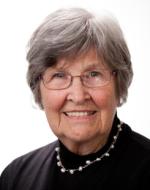 Quotes about Covenant: “What Binds Us”
Quotes about Covenant: “What Binds Us”
Bettye Barclay has provided this list of quotes about our ministerial theme for May. Daily quotes also appear in the weekly electronic announcements.
Week 1. What is a covenant? Here’s a definition that I learned years ago while training to be a New Congregation start-up minister. “Covenant is the central unifying promise or commitment that binds a religious community together in voluntary loyalty. It grows from an affirmation of shared needs, values, purposes and principles. As such it is rooted in the past, in the tradition of the congregation, and reflects the embodiment of the promise through history. It is a promise made in the present, with implications for the future” — Rev. Roberta Finkelstein
Week 2. Love always creates, it never destroys. In this lies man’s only promise. — Leo Buscaglia
Week 3. Dr. King’s leadership reaffirmed the promise of our democracy: that everyday people, working together, have the power to change our government and our institutions for the better. — Maria Cantwell
Week 4. The deepest depth of vulgarism is that of setting up money as the ark of the covenant. — Thomas Carlyle
Week 5. Mindful of truth ever exceeding our knowledge, of love and compassion ever exceeding our practice, reverently we covenant together, beginning with ourselves as we are, to share the strength of integrity and the heritage of the spirit, in humanity’s unending quest for reality and love. — Walter Royal Jones
May Worship Theme: Covenant - "What Binds Us"
Please watch your email...
 Dining for Dollars...
Dining for Dollars...
Want to join our communications team?
✒ Can you gather information from church announcements and orders of service?
✒ Are you a shutterbug?
✒ Do you find yourself correcting grammar, spelling, or punctuation for fun?
✒ Can you find your way around Adobe InDesign?
Interweave will Host the May Second Sunday Supper with a Rainbow of Lasagnas
Happy hour begins at 5:45pm
Fundraiser for Faith in Action Commission
SAVE THE DATE!
Climate Justice Month events sponsored by Green Committee
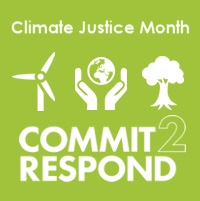 This past month your Green Living/Green Sanctuary Committee, in partnership with other Faith in Action members, has been sponsoring activities in our congregation to support UUA’s Commit 2 Respond efforts during Climate Justice Month, March 22 to April 24. On March 20, in honor of World Water Day, March 22, children from RE joined Green Committee members for a beach cleanup that included an introduction by a speaker from Heal the Bay. We will be sponsoring two more of these cleanups over the next few months.
This past month your Green Living/Green Sanctuary Committee, in partnership with other Faith in Action members, has been sponsoring activities in our congregation to support UUA’s Commit 2 Respond efforts during Climate Justice Month, March 22 to April 24. On March 20, in honor of World Water Day, March 22, children from RE joined Green Committee members for a beach cleanup that included an introduction by a speaker from Heal the Bay. We will be sponsoring two more of these cleanups over the next few months.
Alison Kendall and Beth Brownlie led a weekly spiritual practice to learn and share how to align our daily life more closely with the needs of Mother Earth and all living things including our own future generations. Each meeting focused on one aspect: Water, Energy, Air, and Resources.
Rick Rhoads and James Witker led a four-part discussion of Naomi Klein’s book, “This Changes Everything.” The film version of this book was shown during January’s Second Sunday Cinema event, sponsored by Faith in Action.
Our well-attended Second Sunday Supper on April 10 included a main dish supplied by this month’s recipient of our congregational Generous Contribution, Community Services Unlimited (CSU). The executive director of their program, Neelam Sharma, provided a brief overview of the many projects they are working on in South Central Los Angeles.
 On April 24, in conjunction with our congregational celebration of Earth Day, committee members, along with YRUU, provided several gardening workshops for RE youth, helped set up a rain barrel capture system, and offered Reflections in both services. Alison Kendall (9 am) and Francois Bar (11 am) spoke in more detail about CSU and the food justice services they provide the South Los Angeles community.
On April 24, in conjunction with our congregational celebration of Earth Day, committee members, along with YRUU, provided several gardening workshops for RE youth, helped set up a rain barrel capture system, and offered Reflections in both services. Alison Kendall (9 am) and Francois Bar (11 am) spoke in more detail about CSU and the food justice services they provide the South Los Angeles community.
Our final activity for Climate Justice month was presenting the film, “The Wisdom to Survive,” with our friends from FIA as an Earth Day Sunday Movie night. The event included discussion and networking for environmental activists.
At our next meeting, from 12:30 – 2 pm on Sunday, May 1 in SE Cottage, we will be planning future events. We invite you to join us.
— Rick Teplitz, Green Living Committee
GA to vote on divestment from companies profiting from Israeli occupation of Palestinian territories
This June the UUA General Assembly will consider a business resolution calling for divestment from companies complicit in maintaining and profiting from Israel’s 48-year occupation of the West Bank and siege of Gaza. Placing the resolution on the GA agenda required obtaining signatures of 250 UU members on a petition calling for such divestment –no more than 10 signatures from at least 25 congregations. The petition campaign was mounted by Unitarian Universalists for Justice in the Middle East (uujme.org), a UUA-related organization founded in 1971, and received 1,700 signatures from UUs in 100 congregations. The organization’s mission includes working “for a peaceful and just resolution of the Israeli-Palestinian conflict, including a settlement affirming the equality, dignity, freedom and security of all peoples involved.”
The resolution targets five companies: Hewlett Packard Enterprise, which developed a biometric system to identify Palestinians entering Israel via major checkpoints from the West Bank; HP Inc.; Motorola Solutions, which supplies the Israeli army with equipment; Caterpillar Inc., whose bulldozers have demolished Palestinian homes and olive trees; and G4S, a British security company that provides equipment and services to Israeli prisons. (These or other companies have been the target of boycott and/or divestment campaigns by other faith groups, including the Presbyterian Church (USA), the United Church of Christ, and the United Methodist Church.) Because the UUA and its Common Endowment Fund in March adopted a new human rights screen focusing on conflict zones, they have already begun divesting from three of the companies involved in human rights abuses and environmental degradation. UUJME will advance the resolution at GA, also viewing it as an opportunity to educate UUs about the situation.
UU Santa Monica members and friends who were studying the conflict via an adult RE class earlier this year participated in the petition campaign, getting 10 of our members to sign on. Nine of us met for seven sessions, using a UUJME-produced study guide (pub. 2015) based on our seven UU principles.
We now have a UUJME chapter, a sub-committee of our Peace and Social Justice Committee, joining 26 others around the country. Let us know if you are interested in participating in another adult RE study group on Israel-Palestine.
— Roberta Frye
Many thanks to the 25+ members of our community and friends who were able to walk in solidarity with our Muslim neighbors for Interfaith Peace on Sunday, March 6. Soraya Deen of the Islamic Center wrote to Rev. Rebecca afterwards to say, “the UU churches are such a breath of joy and hope.” Let’s keep building bridges and not walls!
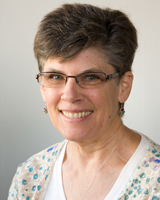 Consultant Hired to Help Restore Right Relations in Our Congregation
Consultant Hired to Help Restore Right Relations in Our Congregation
Many guests attended the April 12 Board meeting. We began with dinner, cooked by our President, followed by chalice lighting and check in. I thanked President Patricia Wright for her two years of service as the leader of our congregation’s governance, and Beth Brownlie thanked her for the many delicious dinners she has made for us.
The first item on the agenda was a presentation by a special guest, Nancy Edmundson from the UUA Pacific Region. She is contracting with us as a consultant to work with us to restore right relations in our congregation. The motion to approve her contract was shared in a Board email blast to the congregation and will be in the Board minutes posted on the website.
The Board passed the consent agenda. We welcomed new members Emma Stashin, Alice Hall, Lauren Movius, Kristina Schauer, Laura Matthews, Jon MacCulloch, Sean Cameron, Tracy Blair and Tyler Melton, and Lorenzo Pelayo. Total membership stands at 337.
The Board then reviewed the FY 2016/2017 Budget as presented by the Finance Committee. It was noted that this final budget differs only in minor details from the budget presented at the Town Hall Meeting on May 3, 2016. The Board approved the proposed budget as presented. The congregation must approve a budget at the Annual Meeting.
The Nominating Committee presented the slate of candidates for the 2016/2017 fiscal year. The congregation will vote on these candidates at the Annual Meeting: President: Ron Crane; Vice President: Jacki Weber; Secretary: Phil Bonacich; Treasurer: Kim Miller; New members at large: Kikanza Nuri-Robins and Beth Brownlie; Nominating Committee new members: Barbara Gibbs and Rick Rhoads.
The Board reviewed special items that will appear on the Annual Meeting agenda. Nurit Gordon, Church Administrator, reviewed the timeline for meeting preparations. The last date for candidates to be nominated by petition is May 2. The agenda will be mailed to all voting members on May 5. Lunch will be available for purchase before the meeting.
The Board passed a Personnel Policy for Employee Grievances, which had been written by the Personnel Committee. It will become part of the Employee Manual posted on our website and appear in the minutes of the April meeting, which will also be posted once they are approved.
Beth Brownlie presented the Pledge Team annual report and reported that the team is pleased with the outcome of its activities this year. Members are committed to continue to work towards increasing meaningful giving for the benefit of our community.
Beth also reported that preliminary steps are being taken to replace the church sign at the corner of 18th and Arizona, which has deteriorated significantly.
— submitted by Cynthia Cottam
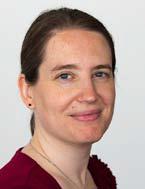 FROM OUR DIRECTOR OF RELIGIOUS EDUCATION
FROM OUR DIRECTOR OF RELIGIOUS EDUCATION
We are a Religious Community, not a Social Club
As we move into May, I find myself following familiar patterns of preparing for summer programs and wrapping up the church year as well as creating a map for the next year’s RE program which will launch in August. This month’s ministry theme, Covenant, feels particularly apt — now is a time in our community for setting our vision for how we will work together to carry out our mission to “Love Generously, Seek Truth, and Serve the World” in the coming year.
It is very likely that you will find at least one member or group within our community to be challenging to work with at times (and, lest we be tempted to point fingers, any one of us may BE the one who is challenging for someone else!). It is easy to hold the circle of community with those we feel are like-minded, or those we like. It is harder – and deeper and more spiritual — work to hold the circle of community with people who rub us the wrong way, or who don’t always act the way we think they should. And these interactions, as tough as they are, are also gifts to us — we need that work! We are a religious community, and not a social club, because of our commitment to building the kind of beloved community that includes and embraces and challenges all of us to live increasingly more authentic and compassionate lives, and that means seeking to be in authentic community with one another, especially when it is hard.
Unitarian Universalism in this country was formed in 1961 with the merger of the Universalist Church of America and the American Unitarian Association. The Universalist side of our heritage reminds us that we can never run out of chances to turn toward one another, no matter how disconnected we feel we are. And the Unitarian legacy of covenantal church calls us to trust in the power of our covenant — our agreement to “walk together” as one people of faith — to build a beloved community that will nurture those within our walls and give us resources and inspiration and company for the work of bringing the life-giving message of our UU faith out into the world in every choice we make, every single day.
UU minister Victoria Safford writes, “We are bound by covenant, each to each and each to all, by what theologian Rebecca Parker calls ‘freely chosen and life-sustaining interdependence.’ The central question for us is not, ‘What do we believe?’ but more, ‘What do we believe in? To what larger love, to what people, principles, values, and dreams shall we be committed? To whom, to what, are we accountable?’ In a tradition so deeply steeped in individualism, it becomes a spiritual practice for each of us to ask, not once and for all, but again and again, even over 90 years of life: How do I decide which beautiful, clumsy, and imperfect institutions will carry and hold (in the words of one congregation’s bond of union) my ‘name, hand, and heart’?”
Let’s take this month’s theme of Covenant as an invitation to start afresh with one another. This is our congregation. It is a whole church family. And we are bound together by choice and by covenant, rather than by doctrine or creed. We are a pluralistic community — not a gathering of like-minded people but an intentional congregation of diverse thought and opinion and need and expression. Oh friends, I am so glad that each of you is with us. I am so glad that we don’t all agree.
— Catherine Farmer Loya
FROM THE ADULT RE SUBCOMMITTEE
Groups Continuing in May
Thursday Night Centering Meditation
We will do Centering Meditation where you choose a word to say silently to yourself as you enter the silence. You can choose a word such as peace, love, joy, etc. There will be a brief time of comments, sharing and questions. We will end the evening with a guided Mindfulness meditation. Please contact the Facilitator Bettye Barclay beforehand: bfbarclay@earthlink.net
Groups starting in May
Literary Heads Up: Common Read Discussion Group coming in May!
“Just Mercy: A Story of Justice and Redemption” by Bryan Stevenson (2014, Spiegel & Grau, an imprint of Random House) is this year’s UUA Common Read. Stevenson, founder of the Equal Justice Initiative, has dedicated his legal career to defending those who are trapped by an often capricious, political, and willfully unjust criminal justice system — poor people, people of color, children, and others over whom the system has run roughshod. It speaks to justice, mercy, and compassion, themes of concern to us as Unitarian Universalists and as human beings.
There will be three sessions on Sunday as follows: May 15, 22, and 29 from 4 – 6 pm. Location TBD
You can purchase your book online at www.uuabookstore. org. A free online study guide is also available at the website.
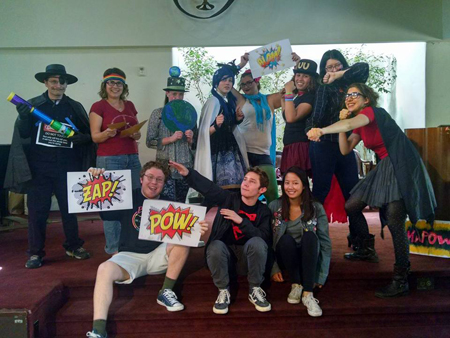 YRUU Performance
YRUU Performance
The YRUU senior high youth group at UU Santa Monica performed an original play, “The Adventures of Captain UU and the Seven Principles sUUperheroes.” The play was the Story for All Ages during their YRUU Service on Sunday, April 17. The story is now being submitted to the UUA for use in UU churches throughout the country. Photo by Liza Cranis
